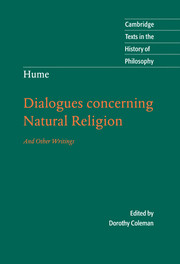Book contents
- Frontmatter
- Contents
- Acknowledgments
- Introduction
- Chronology
- Further reading
- Note on the text
- List of abbreviations
- DIALOGUES CONCERNING NATURAL RELIGION
- Pamphilus to Hermippus
- Part 1
- Part 2
- Part 3
- Part 4
- Part 5
- Part 6
- Part 7
- Part 8
- Part 9
- Part 10
- Part 11
- Part 12
- OTHER WRITINGS
- Index
- Cambridge Texts in the History of Philosophy
Part 9
Published online by Cambridge University Press: 05 June 2012
- Frontmatter
- Contents
- Acknowledgments
- Introduction
- Chronology
- Further reading
- Note on the text
- List of abbreviations
- DIALOGUES CONCERNING NATURAL RELIGION
- Pamphilus to Hermippus
- Part 1
- Part 2
- Part 3
- Part 4
- Part 5
- Part 6
- Part 7
- Part 8
- Part 9
- Part 10
- Part 11
- Part 12
- OTHER WRITINGS
- Index
- Cambridge Texts in the History of Philosophy
Summary
1 But if so many difficulties attend the argument a posteriori, said Demea; had we not better adhere to that simple and sublime argument a priori, which, by offering to us infallible demonstration, cuts off at once all doubt and difficulty? By this argument too, we may prove the infinity of the divine attributes, which, I am afraid, can never be ascertained with certainty from any other topic. For how can an effect, which either is finite, or, for aught we know, may be so; how can such an effect, I say, prove an infinite cause? The unity too of the divine nature, it is very difficult, if not absolutely impossible, to deduce merely from contemplating the works of nature; nor will the uniformity alone of the plan, even were it allowed, give us any assurance of that attribute. Whereas the argument a priori …
2 You seem to reason, Demea, interposed Cleanthes, as if those advantages and conveniences in the abstract argument were full proofs of its solidity. But it is first proper, in my opinion, to determine what argument of this nature you choose to insist on; and we shall afterwards, from itself, better than from its useful consequences, endeavour to determine what value we ought to put upon it.
- Type
- Chapter
- Information
- Hume: Dialogues Concerning Natural ReligionAnd Other Writings, pp. 63 - 67Publisher: Cambridge University PressPrint publication year: 2007



